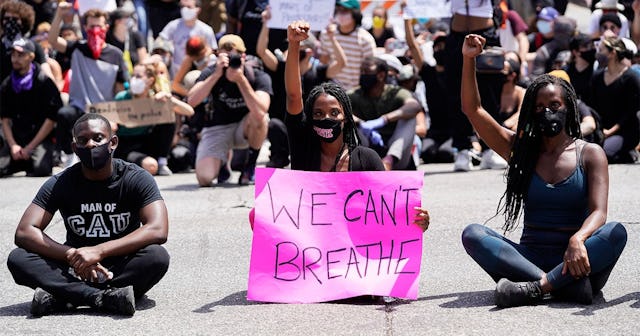They Are Protests, Not Riots, And Here's All The Good They've Accomplished So Far

The streets have been full for nearly two weeks. People have shown up by the thousands in the wake of death of George Floyd. The call to action has been heard around the world. And depending on what you read, the movement is a protest or a riot.
Words matter. Names matter. The language you use to describe a movement can frame the way future generations learn it for centuries to come. A riot, as defined by Merriam Webster, is “a violent disturbance of the peace by a crowd.” Whereas a protest is “a solemn declaration of opinion and usually of dissent.”
Stephen Maturen/Getty
There’s nothing inherently wrong with a riot—history is rife with stories of uprisings against oppressive and unfair governments, and a riot to protest injustice is arguably better than a riot to celebrate a sports team victory—but to call the movement currently taking the streets a riot distracts from the truth: The thousands of people on the street are largely gathering peacefully to declare their opposition to a system that has consistently proven to devalue Black lives.
Calling the movement a riot, rather than a protest, makes it easy to ignore the significant impact the protests have made. And there have been many.
Scary Mommy put together a non-exhaustive list of all the things the Black Lives Matter protests have accomplished in just two weeks.
- The charges against Derek Chauvin in connection with the death of George Floyd were upgraded from third degree murder to second degree. The other three officers involved in the arrest were also charged and arrested.
- The words “Black Lives Matter” were painted on the street leading to the White House and the Mayor of Washington D.C. renamed the street Black Lives Plaza. Similarly, the words Black Lives Matter were painted on one of the busiest streets in New York’s state capital.
- The New York State Legislature voted to repeal Law 50-A, which has kept police disciplinary records hidden from the public for the last 44 years.
- In Minneapolis, where the protests originated, the City Council voted to ban choke holds and neck restraints in all circumstances. Nine council members also committed to dismantling the Minneapolis Police Department, which has a long history of racism accusations.
- Minneapolis public schools and the Minneapolis Parks and Recreation Board terminated contracts with the Minneapolis police department, answering the call of many activists who’ve long questioned whether police in schools do more harm than good, particularly for students of color. Portland schools made a similar decision just days later.
- The FBI opened an investigation into the death of Breonna Taylor, months after the Louisville Metro Police Department failed to hold anyone accountable.
- Dallas adopted a duty-to-intervene rule requiring officers to intervene whenever they witness a fellow officer using excessive force.
Hollie Adams/Getty
- NASCAR announced it would ban confederate flags from its events and properties.
- The New Jersey Attorney General vowed to update its use of force guidelines for the first time in twenty years and create a licensing system for police officers.
- Maryland lawmakers announced a bipartisan effort to pass meaningful policing practice reform.
- In Los Angeles, the Mayor, along with city officials, announced plans to reduce the Los Angeles Police Department budget and re-allocate the money to community oriented initiatives like jobs for youth.
- Bus drivers in Boston refused to drive cops to protests or transport protestors who got arrested. Bus drivers in other states, including New York and Minneapolis, have followed suit.
- Philadelphia removed a statue of Frank Rizzo, a known racist former police commissioner and mayor. Confederate monuments in several other states were removed, as well, including Alabama and Virginia. Even England joined in on the statue removal.
- More people than ever are learning what anti-racism means and what it means to be an anti-racist. Books on anti-racism are sold out on Amazon, and in many local bookstores. (If you’re on the hunt for one of the sold out books, don’t forget to check out your library, or virtual library.)
- Colleges are revoking acceptances to students who post racist sentiments on their social media.
- Companies are paying attention, beyond just putting out vague statements in support. Sesame Street hosted a town hall for kids and parents on anti-racism. Warner Brothers made Just Mercy free for streaming. HBO pulled Gone With The Wind to add a note regarding historical context. Amazon will halt police officers’ access to its facial recognition tool.
- The entire world started to listen to what activists have been saying for years, and agreed that Black Lives Matter.
The changes are real. Some can be quantified and some cannot. Some will no doubt go down in history as being invaluable, while others remain steps on the path toward progress. But they are all long overdue, and these changes will likely be the reason someone lives rather than dies. And that in itself is worth protesting for.
This article was originally published on